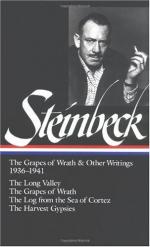|
This section contains 1,323 words (approx. 4 pages at 400 words per page) |

|
Everything as a Part of One Whole
The most profound concept that permeates both Steinbeck and Ricketts's thinking is that everything is part of one whole, and the whole is also reflected in each being. This idea affects how they see the world around them, how they relate the parts to one another, how they do science, and their philosophy of life. The idea is most strongly and directly developed in the "Easter Sunday" passage in chapter fourteen. Here, they present "teleological thinking" as looking for limited cause and effect relationships between just a few objects or actions. "Non-teleological thinking" reflects their point of view, and attempts to look at all things as part of a larger whole. One is constantly asking the question "why?" and "what else might be happening that relates to these events?". This question and the answers to it lead to yet more questions, which...
|
This section contains 1,323 words (approx. 4 pages at 400 words per page) |

|




